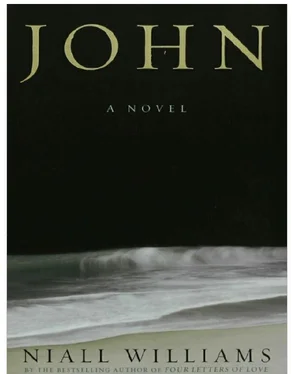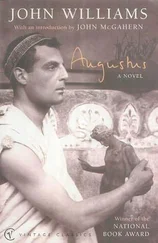But the weather is clement, and clemency seems the coming mood of season. Papias himself prays thanks for his rescue; he does not know or understand yet the reason and prays to know his purpose. But for now that purpose is the care of these disciples. The words of the Apostle concerning love are with him like a white stole. God is love, he says to himself many times, and feels in this a vast illumination as though a rock has been pushed back and a bright revelation beheld. If he can hold on to this, if he cannot forget for one moment, then the world is easily lived, he thinks. Within the white aura of this radiance he can put aside any thought of Matthias and the others. He can banish the disturbing thought of the rupture in the community, the versions of his death and resurrection, and the evidence that evil exists.
The sun shines.
By the twentieth day the spring is truly come, but the disciples weaken visibly. Papias thinks to squeeze berry juice in their water, anything that may give strength. But then chastises himself for not trusting the Lord. He himself tries to eat little, but the hunger is fierce and he fears he grows weak and risks illness, so he takes a little more. As he brings the water from one silent old man to the next, he watches for signs they need more. But rarely do their eyes rise to meet his or is there the slightest indication they know he is there. They are as ones gone away, their bodies like cloaks cast off. Nonetheless, Papias can see the wastage. He can see the bones emerge, the skeletal features of Meletios, the sharp jawbone of Danil, and worries compete with his faith. How can there be twenty days more?
At sunrise each day he goes to the table rock alone. He has been asked to ring the bell for Lemuel, though none are to gather. And so he does, hand-beating the dull notes to the pale sky, where the birds turn over in surprise having forgotten men exist. After the prayer bell he rings again, one chime for each day of the fasting past, then he kneels alone and prays. Sometime across his prayer there comes to him the image of the greater world. He has a glimpse of places far away, the villages and towns where the ordinary business of markets and merchants continues, where the day is begun not with a bell but stalls and salutes and the cry of prices. He sees the world gone ahead without him and for moments feels the melancholy of that loss. Out there is the life he might have lived, might be living now, with a family and neighbours, the joys and complaints of every day. On his knees by the table rock he must pray himself back to concentration. No, he has chosen this other life. Because he has a purpose. Because the Lord has a purpose for him, though it may be no more than to attend the Apostle. So be it. If that is his will. Amen.
By the thirtieth day, speech and food, company and discourse seem things of a lifetime ago. Never was so much loneliness. Here is the lone moving figure of Papias crossing the near shore, where the seabirds rise lazily before his approach and land not six paces further on, as though he will not come there. They alight and land, cawing, scuffing the sand, wing-brushing where sandflies stand. He goes with heavy heart to the path across the island, and hurries then to the place of his private grief and guilt. In this season of purge he returns to the burnt ground where stood the house of the fisher's wife Marina. His stomach turns as he approaches. He feels he might fall down, but doesn't, but in him breaks the cords in which are tied up his emotions, and his shoulders shudder. He sees the blackened stone mound of the grave of the children, and a wail is torn out from inside him like a line with jagged hook.
O Lord, hear thy servant.
O Lord, if it be thy will, send us your mercy that we might abide.
Forgive us our trespasses.
If it be thy will, send us a sign.
Forty days and nights of fasting. Forty days and nights of prayer ascending. John remains as he was in the beginning. The Apostle is as ever, some part distant, as though a portion of him is perpetually engaged elsewhere. He suffers the fast without evidence of decline. It is as if for him food and sleep have already been abandoned and the necessities of life for others are for him idle. He remains. His great age matters not. He may live for ever, or until the Lord Jesus comes for him. So it seems. In his blind silence he sits, a rock of faith. He touches the water to his lips only; they flake and scab, but he pays them no attention. His praying is like the instrument of the gifted. He knows its form and features so well that it is become his second nature. He is more than comfortable within it. He sees the words in his mind without saying them. He sees the distance between heaven and earth in terms of height and tilts his head slightly backwards as if in his darkness he will see the light coming. The prayers flow from him. Sometime he finds in himself the words of the psalms, and twenty, thirty of them flow past his mind; other times a single one recurs and repeats until it becomes like the noise of a wind blowing upwards. He prays. The forty days and nights pass over him.
The springtime comes all about the island as the disciples fast. It announces itself in light and air. Warm breezes play at the cave entrance. The sea sings lightly. What sign is expected, what the community seeks, has not been said. The fasting was for each not for reward, and God is not to be bargained with.
But as he rings the bell for the fortieth day, Papias feels there will be something. Something will happen. He knows it. He has food prepared for the supper after midnight. All day he feels the strange exhilaration of imminence. The disciples have come through. Though they have weakened, their faces gaunt, their flesh a yellowish hue, and the eyes of many shot red with blood, they have endured. He rings the bell as loud as possible. Let the sound peal out! Let the heavens hear! It is the final day.
He walks the shore with quickened step. The sky is perfectly blue, the light thrilling. Papias's belief in miracle is such that anything could happen. It might come from the sea or the air, he thinks. The waves themselves could stop in mid-fall and then curl back as they did for Moses, or the blue canopy overhead open, amber-fringed, and golden chariots with angel charioteers appear. Winged horses could thunder down the sky, trumpets herald the Almighty. It could be so. It could be. At any moment the Lord might come for his beloved disciple. So the day has been made lovely, so the sea glistens like polished glass.
Papias walks the full length of the curved sand to the rocks and then back again. He prays to be worthy to witness. He prays that our Lord of Infinite Mercy forgive him his sins. The tender skin of his ear wound burns with the sun. He holds a palm against it as he walks, as though to keep in something he hears. His footprints parallel those of earlier days. Birds are in the sky. He watches these, too, for the possibility of signs. Anything can be used as the language of the Lord, for he created all. Just so, even flies. The world is thus to the youth as he comes along the shore, it is charged, loaded with meaning; just beneath the surface of all is this pulsing sense of advent. It is the fortieth day.
He returns the full length of the eastern shore to where he left the handbell in the sand. He goes along the stone-way and looks back over the island edge. Not yet, he thinks. He does not come yet. But it will be soon. With light, swift stride he goes back the dry scarp to the dwelling of Danil, where rainwater brims a trough, and he dips two buckets and brings these back to the cave. He empties the water into a large earthen pot and returns to the trough with the buckets to fill again. All the time he keeps his eyes on the sky. Is the blue made thinner? Is the sky in some manner stretched? The color seems less, as though a white albumin has been pressed on to a palette and worked into the blue. Does all now not seem whiter? Is there not a milky opalescence? Look, how the distant rocks are softened in light! How pearled is the very air!
Читать дальше










